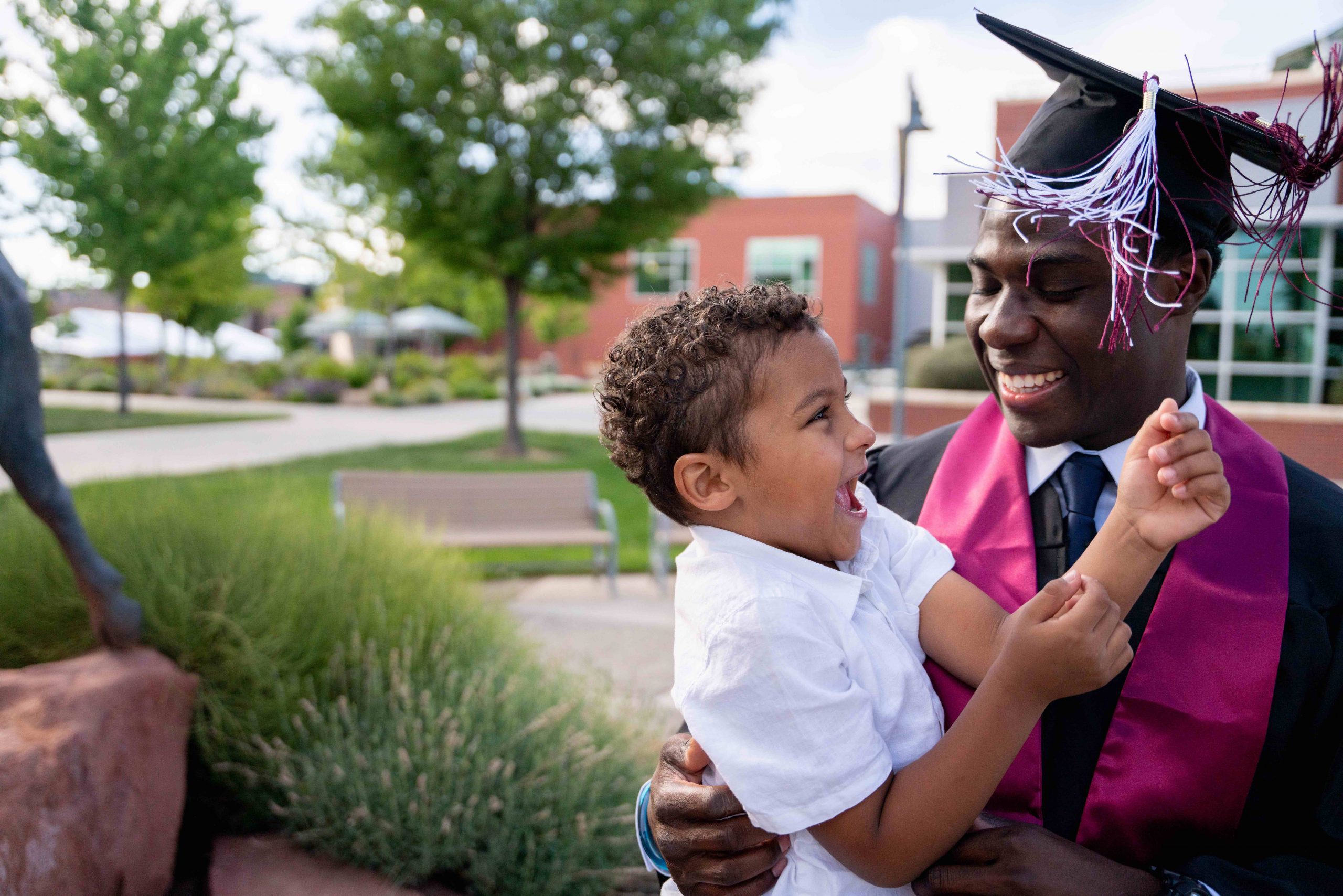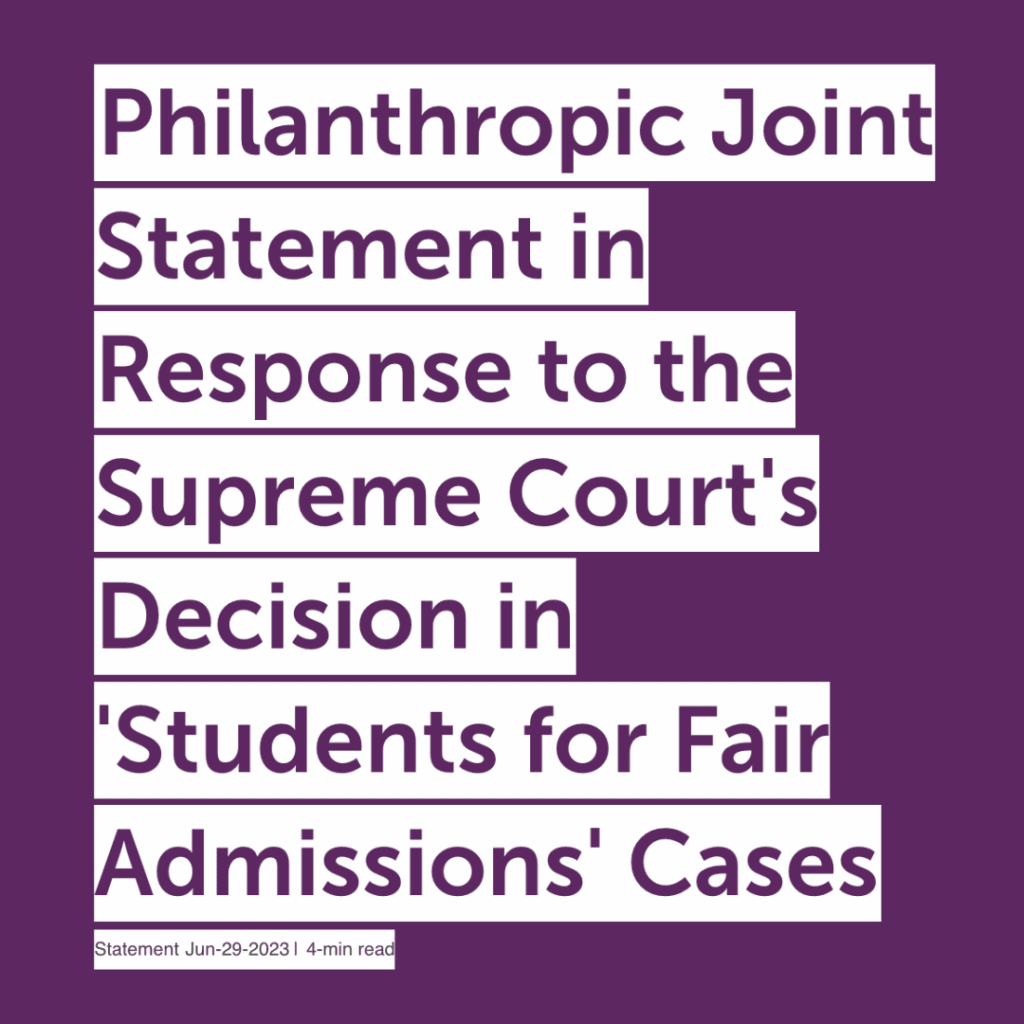United States 
Who Belongs on Campus
The Pace at Which We Advance Equity in Higher Education Has Always Had High Generational Stakes

United States 
The Pace at Which We Advance Equity in Higher Education Has Always Had High Generational Stakes

Last month, the US Supreme Court ignored almost a half century of legal precedent to limit the consideration of race in college admissions policies.
Ensuring that students of color have as many doors open to them as their white peers has been a centuries-long fight that countless communities and institutions have worked toward – one that I know has affected the trajectory of my own life. The SCOTUS decision was a gut-wrenching reminder that we still have much more work to do to achieve equity and justice in higher education. The impact of this decision is already having devastating ripple effects, potentially affecting scholarships and the many efforts organizations are making to diversify their staff, constituents and beneficiaries. While questions remain around interpretation of the SCOTUS decision, I stand with the countless providers and funders who are committed to ensuring diverse access to education, scholarships and funding opportunities.
The decision, shortly thereafter, to strike down the Biden Administration’s student loan debt forgiveness program added insult to injury, cementing greater economic hardship for many students, particularly Black students and student parents, many of whom have some college credit, but no degree (often due to financial and time constraints). Not eliminating their debt will prevent many from the ability to re-enroll, further stalling their dreams for greater economic mobility. (Promisingly, President Biden’s more recent student loan forgiveness plan offers renewed hope for relief for some borrowers.)
The day that SCOTUS ruled against race-conscious admissions, we joined dozens of leading philanthropic organizations in reaffirming our steadfast commitment to supporting efforts to improve diversity in higher education. Although admissions policies that take race into consideration was just one tool to recruit a more diverse and talented pool of students, the SCOTUS decision cuts at something much deeper, noted The Education Trust-West’s Chris Nellum in The Los Angeles Times: “Young people, particularly young people of color…are going receive this as a message that they don’t belong.”

From our joint statement: “Our nation’s future prosperity, vitality, and unity depend upon America becoming a true multiracial democracy—an aspiration that requires racial equity and diversity in higher education. Despite today’s ruling, our foundations will not waver in our commitment to those making the nation’s high ideals a reality for all communities and all people.” Read the full statement here.
Despite receiving better grades than non-parenting students and exhibiting a seemingly relentless determination to complete their degree, colleges – especially the kind of elite, selective colleges most affected by SCOTUS’s decision – do not seem to realize they exist. And when they do, they are often puzzled about how to support their success.
Creating college communities that are open and welcoming to parenting students is one way colleges and universities can continue making progress on diversity, equity and inclusion. At Imaginable Futures, our focus on student parents has always been a racial justice imperative – and it is what brings me to this work. My personal North Star for the past 17 years has been to do all that I can to improve the education opportunities for students of color, particularly Black students.
Ignoring the parenting status of students ignores the realities facing about one in three Black, American Indian/Alaska Native, and Native Hawaiian/Pacific Islander students in the United States, along with one in five Latinx students. This lack of attention toward parents particularly neglects the experiences of the 42% of all Black women in college, the consequences of which follow them the rest of their lives. The pace at which we advance equity in higher education has always had high generational stakes – we remain committed to deploying many more tools at our disposal to accelerate progress.
Young people, particularly young people of color…are going receive this as a message that they don’t belong.
Chris Nellum, Executive Director, The Education Trust-West

Nearly one-third of student parents attend a public or private four-year university. Counter to what you will find in glossy admissions brochures, parenting students do exist at the institutions that are currently worrying about how to foster a more diverse and inclusive campus without race-conscious admissions policies. Colleges and universities will now have to invest many more resources in recruiting and retaining students of color amid shrinking higher education budgets. But here, elite colleges can learn from community colleges and minority-serving institutions that have long done more with less in supporting their diverse student bodies, including student parents. Historically Black Colleges and Universities (HBCUs) and Tribal Colleges and Universities (TCUs), in particular, have served communities often ignored by elite college recruitment efforts, providing compassionate, supportive and welcoming learning environments.
Elite colleges can learn from community colleges and minority-serving institutions that have long done more with less in supporting their diverse student bodies, including student parents.
Plus, three recent partner resources for supporting student parent success:
“As we navigate a new era for higher education, the road ahead requires forging new paths. Fortunately, we have many existing tools and promising ideas for new ones that can help us reimagine a higher education system that extends its promise to all students.”